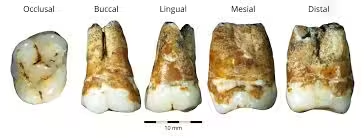Written By: Frank Knott, Lead Instructor of LionMan ReWilding
Teeth and the associated jaw muscles are among the body’s most overlooked and underutilized parts. They are a long-forgotten tool of our ancestors.
In a recent study, scientists studied the teeth of the Mesolithic population of the Croatian peninsula to determine their diet, primarily fish and starchy plants. Upon closer examination, they found traces of fish scale microfossils, suggesting they used their teeth to scale their fish. Studies in Neanderthal tooth wear indicate they used their teeth as a “third hand” while preparing animal hides, softening fibers, and even retouching tools!
*
As a fisherman, I can’t attest to ever using my teeth to describe. For one, the shape of fish scales would stick to regions of the mouth. That’s an irritating and almost painful thought. However, I can attest to using them for many other things.
I’m sure some of you have seen videos of people opening beer bottles with their teeth, and while it may be painful to think about, it certainly stands as a mark of strength. When appropriately used, teeth can act as a third hand or vice with many activities – namely animal hide preparations – whereby holding a corner of the hide with your teeth and one can stretch and scrape simultaneously!
Today, I mainly use my teeth to strip ripe mangoes of their rind. Another activity is stripping bark during the spring sap run season. By biting and clamping the teeth around the wood, the front and lower teeth slide under the bark and gently strip it off.
Fishing has been using teeth to help with tying lines since the dawn of the sport/subsistence strategy. The technique involves holding the end of the string with the teeth and using a hand to tighten the knot. My dad has even figured out how to cut fishing lines of all tests with their teeth, some of which I have yet to achieve.
*
Schools today teach us proper dental hygiene practices from a young age, such as flossing and brushing our teeth twice a day. However, our ancestors had even healthier teeth than we do! The “de-evolution” of our dentition started with the advent of the agricultural revolution and the introduction of grains and sugars into our diets, creating new bacterial biomes in our mouths. I believe the hunter-gatherers’ lifestyles and the diets associated with such activity may not have given them the whitest or straightest teeth, but certainly the healthiest.
To throw one more childhood anecdote out there, I remember trying to cut down a sweet gum tree. In the effort to push and twist it down, it sprang up and cartoonishly hit me along my entire face.
Yet, while doing an archaeological survey a few years ago, I was hit with a branch of Brazilian pepper, chipping my entire tooth. Both incidents made me re-examine my diet (the dirty bulking strategy used by many YouTube gymnasts). I’ve realized that my best bet is to adopt my childhood diet, which consisted of deer, rabbit, and garden vegetables my mom served every night. I couldn’t help but make an unofficial correlation.
*
The ReWilding lifestyle may not be for everyone; learning these skills requires dedication. Understanding the benefits of such a lifestyle is a passion and focus not called for in most modern diets. Even the consistent diet of nuts and more complex vegetation by extinct species of Hominids led to them having larger molars and considerably thicker enamel than us. We can’t guarantee that returning to a natural lifestyle will give you thicker enamel or instantly make your teeth more robust.
We promise you will notice a change in your energy levels and attitude, and your biome will thank you! We welcome you to explore our in-person LionMan ReWilding courses!
References
- Carlsen, Audrey. “Ancient Chompers Were Healthier than Ours.” NPR, 24 Feb. 2013,
www.npr.org/sections/health-shots/2013/02/24/172688806/ancient-chompers-were-
healthier-than-ours/.
2. Cristiani, E., Radini, A., Borić, D. et al. Dental calculus and isotopes direct
Evidence of fish and plant consumption in the Mesolithic Mediterranean. Sci Rep 8,
8147 (2018). https://doi.org/10.1038/s41598-018-26045-9

